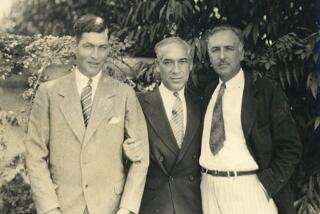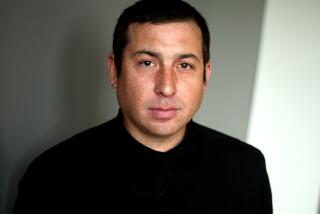Alexander Payne considers ‘The Descendants’ training for westerns
Alexander Payne’s Oscar for his “Sideways” screenplay (shared with writing partner Jim Taylor) should have kicked the writer-director’s career into high gear, but it took seven years for Payne to produce a follow-up. A good chunk of that time was burned up trying to get “Downsizing,” a science-fiction satire whose details Payne has left purposefully vague, off the ground, but he’s come back strong with “The Descendants,” whose dual Golden Globe wins confirm its place as an Academy Award contender. He’s not sitting back waiting to see how the awards play out, however. He’s keeping busy prepping the black-and-white road movie “Nebraska” — his first foray into digital lensing — for a shoot later this year.
Before “The Descendants,” you’d released four films in eight years. Why the seven-year break between projects?
I never would have imagined it would be seven years between releases. I’ve been busier than I’ve ever been all these years. I just wasn’t directing a feature. 2005 was spent after “Sideways,” and then a divorce and moving a couple times; 2006-07 and into ‘08, we doctored a couple of scripts, I did a little producing and mostly we were working on “Downsizing.” In late 2008, I got so eager to take a run around the track that I did a [television] pilot. And then by summer of ’09 I started on this. So it’s not as long as it seems. But I did miss directing a feature. That’s my greatest joy. I didn’t get into this to be a writer.
You’ve talked about wanting to show a side of Hawaii that doesn’t show up in the tourist brochures. How did that play out in practice?
The opening shot of Hawaii is that landscape of skyscrapers in Honolulu and hideous traffic on the H-1. But as the film goes on, there are more interstitial beauty shots that speak to the mood. It’s one of those places where nature is so beautiful and vivid and large that it makes you feel puny, and at the same time ennobled by that puniness. I wanted to get that across. I made those films in Nebraska and tried to get a sense of the place, and then I transferred those skills to Santa Barbara wine country. Even my Paris short, I must say, really shows the 14th arrondissement in Paris. Even [HBO’s] “Hung” has a small but genuine sense of Detroit. I think anymore when I’m deciding to do a film, I audition the place as much as I do the story.
How do you capture that concrete sense of place?
It’s location, location, location, but also framing your shots so the background is always saying something. One director I admire who did that a lot in his films is Anthony Mann. Pictorially, I try to learn from him. And by the way, I aspire to make westerns, or at least a western, for Christ’s sake. And I’m hoping that the way I’m treating these modern films is good training for that. I think people aren’t using the western as they could, as an infinitely malleable form to comment on today’s concerns.
There are comic moments in “The Descendants,” but overall it’s a much more serious and downbeat film than you’ve made before.
I’d like to say as a director I can service any story properly, whether it’s more jocular or more serious. I don’t really think in terms of this many laughs and this much serious stuff. It’s just like life, all part of this one thick texture. I do have a weakness for laughs, though.
Was it hard to give up the instant gratification of comedy? You know when a comedy’s working because the audience laughs, but there’s no way to tell with a drama.
The only feedback you have from a drama is when they don’t walk out. I had previously been terrified of doing a straight drama. But I would say that I aspire to “The Descendants” being thought of as a drama directed by a comedy director, or a drama done with a light touch. I think films should be charming.
Not to compare this film to that, but one of the great American dramas of yesteryear was “Make Way for Tomorrow,” by the comedy director Leo McCarey.
Think of how Chaplin understood pathos. Sometimes I think it’s the comedy directors who most understand pathos and how to do it effectively, not making it overly sentimental.
Chekhov wrote in that letter to a young writer asking him for advice, “The story is too sentimental from start to finish. If you want sentimental effects, you must place them against a cold background so that they stand out in relief.” So I keep that in mind. Plus, I have a big knee-jerk hatred of sentimentality in films.
You’d initially commissioned an adaptation of Kaui Hart Hemmings’ novel for someone else to direct, and then you took it on yourself, writing the final draft without your usual partner, Jim Taylor. How did that happen?
Jim’s been working with his wife, Tamara Jenkins, lately. And I wanted to write this one alone because I actually didn’t feel close to the story at the beginning. I thought it would make a good movie, but, in order to find my own personal way into it, I had to write it myself. It’s still more a story outside of me. It might smell personal, and if it does I’m glad it does, but I wanted to write it alone to feel it inside of myself more. This is my third or fourth adaptation, and it was my closest collaboration with the author. In a way, I would consider my collaborator to be Kaui herself, because I had such a dialogue with the book.
More to Read
The biggest entertainment stories
Get our big stories about Hollywood, film, television, music, arts, culture and more right in your inbox as soon as they publish.
You may occasionally receive promotional content from the Los Angeles Times.






